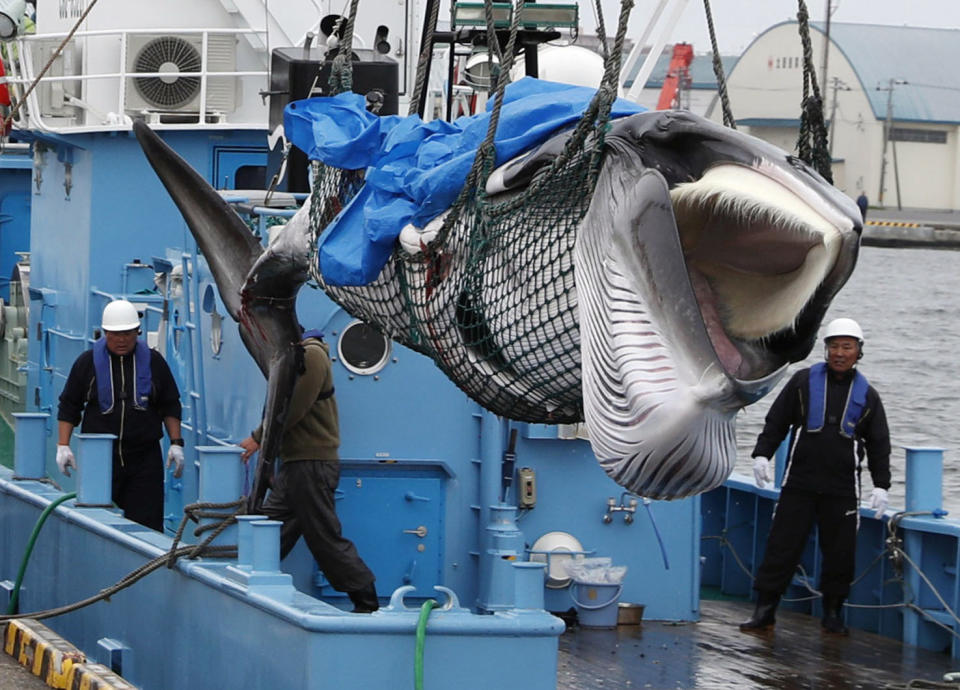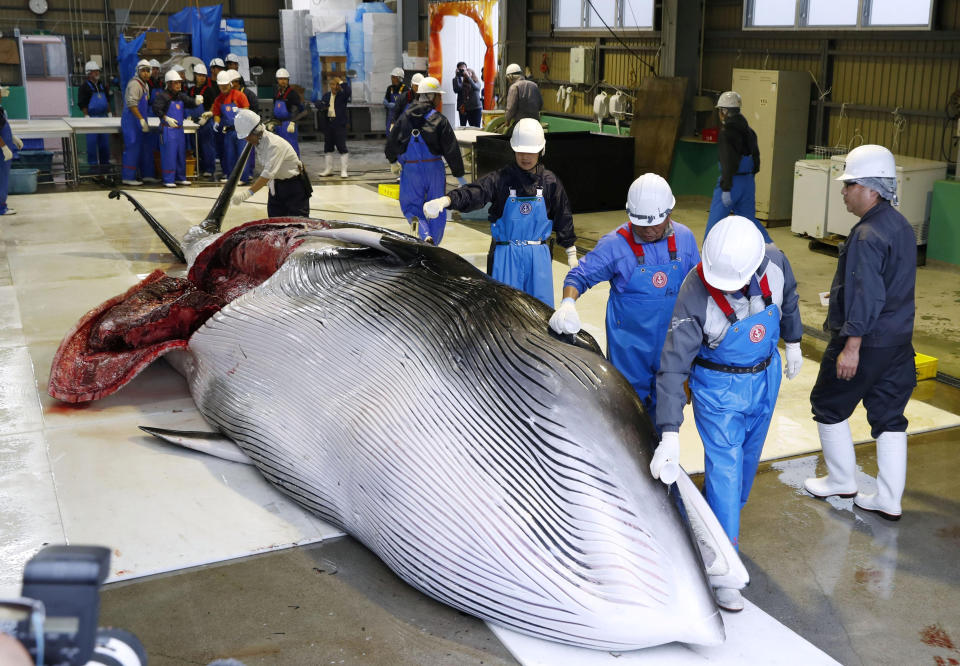'Outdated and cruel': Photos emerge from Japan's first commercial whale hunt in 31 years
Japan has reeled in its first commercial whaling haul in more than three decades, much to the displeasure of Australia and other anti-whaling countries.
Although Japan has always continued to hunt whales in recent years, it was under the thin guise of scientific research.
Now, the country’s largest whaler factory ship, the Nisshin Maru, has scrubbed 'research' from its hull and set out to hunt whales specifically for the meat trade.
Five Japanese vessels set sail from northern Japan's Kushiro with their horns blaring and grey tarps thrown over their harpoons. By Monday afternoon they were back with their catch: two grey minke whales.
One of the whales, more than eight metres long, was hoisted from a ship onto a truck and driven to a warehouse.

Japan has agreed to stop whaling in the South Ocean (also known as the Antarctic Ocean or the Austral Ocean), but will embark on commercial hunts within the country's exclusive economic waters for the first time since 1988.
It comes after Japan officially withdrew from the International Whaling Convention on Sunday.
“It was pretty astonishing that they took the step of leaving, so they could restart commercial whaling,” Darren Kindleysides, from the Australian Marine Conservation Society (AMCS), told Yahoo News Australia.
What it means for whale numbers
Last year alone, Japan killed 333 minke whales in the Southern Ocean in the name of scientific research.
The country has said it will hunt a total of 227 whales as part of its commercial industry.
Mr Kindleysides said it’s a “huge win” to get whaling out of the southern hemisphere and “end the sham of scientific whaling” but said Japan still had international obligations it needed to adhere to.
“These whales are migratory species, they are a shared resource,” he said.
“And they will be hunting the Sei whale, which is actually an endangered species, as well as whales from a threatened Minke population,” he lamented.

Given the dwindling demand for whale meat in Japan and the declining numbers of whales in the wild, the AMCS believes Japan’s whale meat trade is outdated and opens the country’s government up to a legal challenge in international court.
“Whaling is a dying industry – it is an outdated and cruel industry selling a product to a market that has all but disappeared,” Mr Kindleysides said.
“Japan’s whaling is out of step with the international community, and legal opinion shows it’s also out of step with international law.”
Greenpeace Japan agrees and is calling for greater protections for whales.
“Commercial whaling should be ended everywhere. Migratory whales do not recognise borders and cooperative management should apply inside of any nation's economic zone as it does for any migratory species,” a spokesperson told Yahoo News.
However the fact that Japan will be restricted to its local waters has some observers suggesting it is still an overall positive for whale populations.
“What we are seeing is the beginning of the end of Japanese whaling,” the director of the International Fund for Animal Welfare, Patrick Ramage, told the Associated Press.
“It is a win-win solution that results in a better situation for whales, a better situation for Japan, a better situation for international marine conservation efforts and is therefore to be welcomed.”

Australia urges Japan to end commercial hunts
Australia has expressed its disappointment with Japan for resuming commercial whaling after 31 years.
Foreign Affairs Minister Marise Payne and Environment Minister Sussan Ley have jointly condemned the move.
"While the Australian government welcomes the end of whaling in the Southern Ocean, we are disappointed that Japan has withdrawn from the convention and is resuming commercial whaling," the pair in a statement on Tuesday.
"We continue to urge Japan to return to the convention and the commission as a matter of priority."
With agencies
Do you have a story tip? Email: newsroomau@yahoonews.com.
You can also follow us on Facebook, download the Yahoo News app from iTunes or Google Play and stay up to date with the latest news with Yahoo’s daily newsletter. Sign up here.


